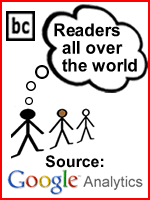|
|
| |
|
| |
|
| |
|
| |
|
| |
|
| |
Monday
was MLK Day, and I was proud to count myself among the
many people working for social justice today who stand
on the shoulders of the Rev. Dr.Martin Luther King,
Jr.
 Too
many people think King�s statements regarding justice
are only about race and the African-American community,
thus excluding the LGBTQ community. But King said,
�[T]he revolution for human rights is opening up unhealthy
areas in American life and permitting a new and wholesome
healing to take place. Eventually the civil rights movement
will have contributed infinitely more to the nation
than the eradication of racial injustice.� Too
many people think King�s statements regarding justice
are only about race and the African-American community,
thus excluding the LGBTQ community. But King said,
�[T]he revolution for human rights is opening up unhealthy
areas in American life and permitting a new and wholesome
healing to take place. Eventually the civil rights movement
will have contributed infinitely more to the nation
than the eradication of racial injustice.�
Members
of King�s family also embrace his words, extending them
to the LGBTQ community. For example, in 1998, Coretta
Scott King addressed the LGBT group Lambda Legal in
Chicago. In her speech, she said
queer rights and civil rights were the same: �I appeal
to everyone who believes in Martin Luther King�s dream
to make room at the table of brother and sisterhood
for lesbian and gay people.�
Like
her parents� faith, the Kings� eldest daughter Yolanda�s
faith in the civil rights movement drove her passion
for LGBTQ justice. �If you are gay, lesbian, bisexual
or transgender, you do not have the same rights as other
Americans,� she said
at Chicago�s Out & Equal Workplace Summit in 2006. �You cannot marry.
... [Y]ou still face discrimination in the workplace,
and in our armed forces. For a nation that prides itself
on liberty, justice and equality for all, this is totally
unacceptable.�
However,
I must say that as an African-American minister having
pastored churches, and having worked alongside black
ministers and their parishioners, I have learned that
whom we shout out and pray to on Sunday as an oppressed
people does not have any relation to whom we damn, discard,
and demonize, thus making us an oppressor to people
marginalized and disenfranchised like ourselves. The
black church is an unabashed and unapologetic oppressor
of its LGBTQ community and, consequently, a hindrance
in progressive movement toward LGBTQ civil rights in
this country.

While
King would undoubtedly shake his head in disbelief concerning
his brethren, he would applaud the stance the NAACP
took on marriage equality. In quelling the tension between
black civil right activists and ministers of the 1960s
who still vociferously state that marriage equality
for LGBTQ Americans is not a civil right, the NAACP
Legal Defense & Educational Fund, Inc. marked the
40th anniversary of Loving v. Virginia (when
the U.S. Supreme Court in 1967 struck down this country�s
anti-miscegenation laws as unconstitutional) by stating
the following concerning same-sex marriage:
It
is undeniable that the experience of African Americans
differs in many important ways from that of gay men
and lesbians; among other things, the legacy of slavery
and segregation is profound. But differences in historical
experiences should not preclude the application of constitutional
provisions to gay men and lesbians who are denied the
right to marry the person of their choice.
If
King were with us today, he would be sad about how homophobia
continues within the black church community, which has
a profound impact on the mistreatment of its LGBTQ community,
and its inattentiveness to the AIDS epidemic ravaging
the black community.
 Religion
has become a peculiar institution in the theater of
human life. Just as the Latin root of the word, �religio,�
means �to bind,� it has served as a legitimate power
in binding people�s shared hatred. But King�s teachings
taught me how religion plays a profound role in the
work of justice. A religion that looks at reality from
an involved, committed stance in light of a faith that
does justice, sees the face of the damned, the disinherited,
the disrespected, and the dispossessed - and that also
includes its LGBTQ people. Religion
has become a peculiar institution in the theater of
human life. Just as the Latin root of the word, �religio,�
means �to bind,� it has served as a legitimate power
in binding people�s shared hatred. But King�s teachings
taught me how religion plays a profound role in the
work of justice. A religion that looks at reality from
an involved, committed stance in light of a faith that
does justice, sees the face of the damned, the disinherited,
the disrespected, and the dispossessed - and that also
includes its LGBTQ people.
As
a religion columnist, I try to inform the public of
the role religion plays in discrimination against LGBTQ
people. Because homophobia is both a hatred of the �other�
and is usually acted upon �in the name of religion,�
by reporting religion in the news, I aim to highlight
how religious intolerance and fundamentalism not only
shatters the goal of American democracy but aids in
perpetuating other forms of oppression, such as racism,
sexism, classism, and anti-Semitism.
I
miss the Rev. Dr. Martin Luther King, Jr. I miss the
sound of his voice, the things he said with his voice.
I miss the choir that resounded within him with his
voice. In keeping his dream alive, we must continue
to lift our voices. We must speak our truth to power.
And those of us who live on the margin must speak out,
because our survival as LGBTQ worshippers in
our faith communities is predicated upon our voices
being lifted.

Each
year, I mark the MLK holiday by reexamining King�s teachings,
remembering that my longing for LGBTQ justice is inextricably
tied to my work toward religious tolerance in the black
church.
And
this is why I continue to speak up.
BlackCommentator.com
Editorial Board member, the Rev. Irene Monroe, is a
religion columnist, theologian, and public speaker.
She is the Coordinator of
the African-American Roundtable of the Center for Lesbian and
Gay Studies in Religion and Ministry (CLGS) at the Pacific
School of Religion.
 A
native of Brooklyn, Rev. Monroe is a graduate from Wellesley
College and Union Theological Seminary at Columbia University,
and served as a pastor at an African-American church
before coming to Harvard Divinity School for her doctorate
as a Ford Fellow. She was recently named to MSNBC�s
list of 10 Black Women You Should Know. Reverend Monroe is the author
of Let Your Light Shine Like a Rainbow Always: Meditations on Bible
Prayers for Not�So�Everyday Moments. As an
African-American feminist theologian, she speaks for
a sector of society that is frequently invisible. Her
website is irenemonroe.com.
Click here
to contact the Rev. Monroe. A
native of Brooklyn, Rev. Monroe is a graduate from Wellesley
College and Union Theological Seminary at Columbia University,
and served as a pastor at an African-American church
before coming to Harvard Divinity School for her doctorate
as a Ford Fellow. She was recently named to MSNBC�s
list of 10 Black Women You Should Know. Reverend Monroe is the author
of Let Your Light Shine Like a Rainbow Always: Meditations on Bible
Prayers for Not�So�Everyday Moments. As an
African-American feminist theologian, she speaks for
a sector of society that is frequently invisible. Her
website is irenemonroe.com.
Click here
to contact the Rev. Monroe.
|
| |
|
| |
|
| |
|
| |
|
| |
|
If you send
us an emaill message we may publish all or part
of it, unless you tell us it is not for publication.
You may also request that we withhold your name.
Thank you
very much for your readership.
|
| |
|
| |
|
| |
|
| Jan 19, 2012 - Issue 455 |
 is
published every Thursday
is
published every Thursday |
| Est. April 5, 2002 |
Executive Editor:
David A. Love, JD |
Managing Editor:
Nancy Littlefield, MBA |
Publisher:
Peter Gamble |
| |
|
| |
|
|
| |
| |
| |
| |
| |
| |
| |
| |
| |
|
|

